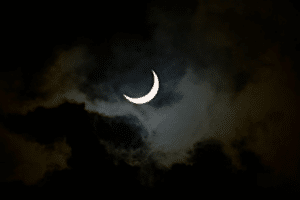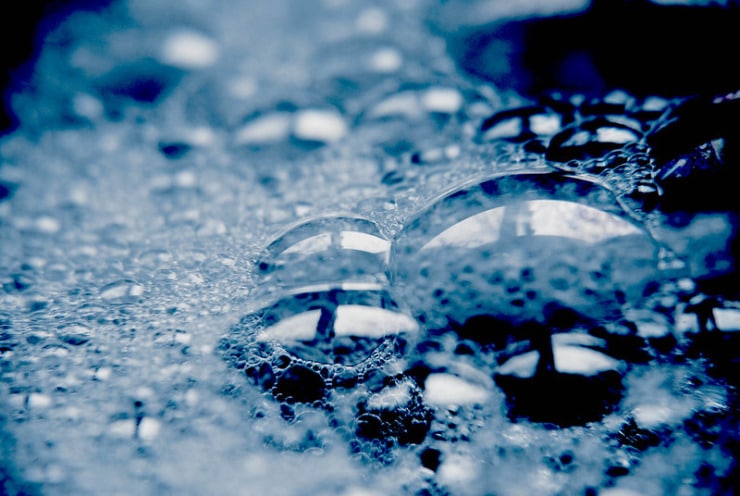Carl Sagan wrote in his novel Contact: “They should have sent a poet.” And that line, when I recently rewatched the film, inspired me to write a poem which I will include at the end of this essay.
The hot mess of the Universe begs for poetry, and back in early 2013, NASA requested the public submit haiku to send to Mars on the Maven Mars Orbiter, later launched in November 2013. At the time, I wrote a few haiku that I never submitted—among them were two or three poems about “Kilroy was here.” (For those too young to remember this phrase, with its mysterious origins, it became popular during WWII and is believed to be the markings of an American shipyard riveter inspector. The enemy came to fear it might be code or espionage.)
In 2014 the Maven Mars Orbiter arrived to circle the planet Mars with a DVD that contained 1,100 haiku selected from over twelve thousand entries, and the mission continues to send data back to Earth. Here are two of the top five haiku:
It’s funny, they named
Mars after the God of War
Have a look at Earth
—Benedict Smith, United Kingdom
Stars in the blue sky
cheerfully observe the Earth
while we long for them
—Luisa Santoro, Italy

Here is an excerpt of Limón’s poem In Praise of Mystery: A Poem for Europa.
… From earth,
we read the sky as if it is an unerring book
of the universe, expert and evident.
Still, there are mysteries below our sky:
the whale song, the songbird singing
its call in the bough of a wind-shaken tree.
—Ada Limón
And allow me to add a little bit about Ada Limón. Her stint as our U.S. Poet Laureate will end this summer in July, and I have thoroughly enjoyed following her through this journey. She’s been vocal and present everywhere in our country, promoting poetry. Her service was most impressive, as was Billy Collins (U.S. Poet Laureate, 2001-2003) who reached out daily to all of us through the 2020 Pandemic (and, at 84, he’s still doing pop-ups!). During Limón’s reign as U.S. Poet Laureate, a collection of poems titled You Are Here was published. It is an anthology of “Poetry in the Natural World,” edited by Ada Limón where, in the book’s Introduction, she writes “Because nature is not a place to visit. Nature is who we are.”
Yet, with all the vast horizons in Texas and beyond, I despair at my meager view of the heavens from my back yard in a once-small town where the big city of Austin has caught up with our boundaries.
Grounded in the Stars
The city does not call me—never
with its clamor and money changers
pressing houses too near and bound
fences where the sky is but a knot.
No, I yearn for the press of blinking stars
in a night sky so wide that I’m small,
so small the darkness cannot find me
in the patina polished by the harmony of it all.
Last night, Mars stared back at me, unblinking,
bold in night, calling me to wallow in the wild
places where an old skunk befriends me,
where the beat of my heart is all the music I need.
—Sandra Fox Murphy
But let’s not forget about the moon, and let’s go way back to the 1970s when Apollo 15 mission sent the Endeavor to the moon in 1971. The pilot of Endeavor was Aldred M. Worden (1932-2020), and in 1974 he published a book of poetry, Hello Earth: Greetings from Endeavor. He shared that writing down his words that turned into poetry was his “own personal, emotional debriefing.” The book is now a collectible, but here are the first three lines from his poem “Floating.”
“I float outside to look around
Slowly, soundlessly,
And my security cord lengthens.”
Perhaps we don’t need to send poets. Perhaps traveling through the heavens, its miracles and mysteries, turns one into a poet. Now, about the moon, here is my poem I first wrote in French, “Quand la Lune Sourit,” followed by the English translation.
Quand la Lune Sourit
La nuit, quand le soleil
se couche à l’horizon,
la lune me sourit –
un sourire espiègle
cõté droit en haut,
tandis que les étoiles clignotent,
ses lèvres courbées
dans une lumière éclatante
qui me touche le cœur.

Photo by Ashwini Chaudhary (Unsplash)
When the Moon Smiles
At night, when the sun
sets below the horizon,
the moon smiles at me—
a playful smile
right side up,
as the stars wink,
her lips curved
in a brilliant light
that stirs my heart.
—Sandra Fox Murphy
Before closing, I want to say a few words about William Shatner and his (brief) ride on the Blue Origins rocket in 2021. Those excursions are strikingly short, but Shatner was moved by his trip to see out planet from above. In his words, “It was among the strongest feelings of grief I have ever encountered. The contrast between the vicious coldness of space and the warm nurturing of Earth below filled me with overwhelming sadness.” His words are such a compelling reminder that we should love our planet and nature so much more.
In conclusion, here is my poem inspired by Carl Sagan’s words:
Beyond
“They should have sent a poet.” —Carl Sagan
How many times and to how many places,
should they have sent a poet
with eyes to see the vaporous?
To see colors not yet imagined
and melodies that waver in night air
in places where shiny objects flicker
and shine as bright as a camera’s
flash and rock walls climbed so high
one cannot see an apex but,
perhaps, a cloud seeps into shale
and swirls the hues to quartz.
Rivers of green and purple
sweeping through a sky as if water
soaring like a bird and at the edge of the sea,
a tattered tooth of a shark calls out
in grains of sand outnumbered by all the stars.
They should have sent a poet to everywhere,
all the nooks and over-looked corners, where a lusty
spider, delicate as the thread it spins, might build
and weave, through knots and turns, a home
with a view of the beyond beyond the beyond.
—Sandra Fox Murphy
Your Turn
How does space, both its darkness and light, show up in your poetry? The universe is full of so much unknown, yet to be discovered, or not. How does this mystery speak to you? Ponder the what if this and what if that. In the words of Plato, “Astronomy compels the soul to look upwards and leads us from this world to another.” Let’s go.
Photo by Caroline Gagné, Creative Commons license via Flickr. Post by Sandra Fox Murphy.
- Poet Laura: The Verdant Respite of Portugal + New Poet Laura Introduction - October 1, 2025
- Poet Laura: In the Glow of the Desert - September 3, 2025
- Poet Laura:In the Sway of Tides - August 6, 2025

Megan Willome says
“How many times and to how many places,
should they have sent a poet”
Yes, indeedy.
Sandra Fox Murphy says
… or, perhaps, it’s the place or the time that makes us the poet. Eyes wide open!
Bethany says
“perhaps, a cloud seeps into shale
and swirls the hues to quartz”
What gorgeous words!
Sandra Fox Murphy says
Thanks, Bethany. I do miss our get-togethers, but I’m still trying some poems in between writing chapters. Here is one I wrote yesterday:
Fata Morgana
If only, at this age, I could
hover above the sea like a surfer,
the me I am in skin now creased
where bones grind, moan the song
of long years while, inside,
I skip to an old tune of latitude.
My body has moved on—
on in years and on to fester.
It’s left me behind at play
where, inside, I’m lithe and limber,
can dance till dusk and oft till
dawn when the cows come home.
When I’m gone, look out across
the waves, look to the dropping sun
and you’ll see me a wing and soaring
like a seagull, hovered toward a dive
into the deep teal sea I love.
Bethany R. says
I’m missing our gatherings too – will be lovely to see folks again in September.
So fun to hear what you’re working on in the meantime!Good job out there– [high five]
And thank you for sharing this bittersweet beauty of a poem here. I’m lingering over these words –
“while, inside,
I skip to an old tune of latitude”
Please do continue to let me know about your writing journey!
Rick Maxson says
Wonderful line:
“bound/fences where the sky is but a knot”
Sandra Fox Murphy says
Thank you, Rick. Words so true to me. What I wouldn’t give for home on horizons of the wide open plains (with its own risks!).